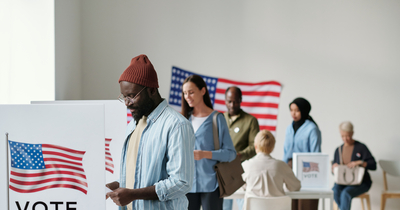
Expanding Voter Registration: Reflections on the Voting Access Executive Order
The Administration has an opportunity to eliminate barriers to the ballot box and empower millions in historically excluded communities

Last week, the Biden-Harris administration announced new voting rights commitments building on the administration's Executive Order to Promote Access to Voting. Issued in 2021 on the anniversary of Bloody Sunday, the voting access executive order remains an important tool for improving ballot access without robust federal voting rights laws.
Since the voting access executive order was first issued, federal agencies like the Internal Revenue Service have expanded voter registration opportunities for eligible clients.
Since the voting access executive order was first issued, federal agencies like the Internal Revenue Service have expanded voter registration opportunities for eligible clients. Many of the agencies covered by the voting access executive order serve communities historically excluded from the political process, including people of color, people with low incomes, students and young people, and Native communities.
Additional examples of progress on the executive order include:
- Increasing Voter Access for Native Communities
Last fall, Indian Health Services (IHS) designated a facility in Phoenix, Arizona as a voter registration site. It is the first of five IHS pilot sites to provide registration opportunities to the Native people they serve. Also, Southwestern Indian Polytechnic Institute, which had previously accepted designation in coordination with the Department of the Interior, officially opened its first on-site voter registration office for students. These efforts bring voter registration opportunities directly to Native communities who have often been excluded and overlooked due to centuries of colonization and racism - Opportunities for Veterans for Make Their Voice Heard
In September, Veterans Affairs selected three locations as voter registration pilot sites in Michigan. This decision will allow veterans and their families who use these sites to register to vote during routine facility visits. - Voter Registration on Campus
Last month, the Department of Education released its Toolkit for the Promotion of Voter Participation for Students. The toolkit provides robust guidance on assisting eligible students with access to voting, including voter registration. As we noted last spring, releasing a toolkit of this kind is an impactful step toward strong implementation by the department. We applaud the Department of Education for following through on this commitment and supporting student voting at the institutions it serves.
Significant opportunity remains in implementing voting access executive order
As extremists in state legislatures and the federal judiciary continue to attack voting rights, the voting access executive order remains a vital tool for strengthening voting access for historically excluded communities. The voting access executive order takes a whole government approach to expanding voter registration opportunities, moving us closer to a democracy where all eligible voters enjoy full political participation. Updated projections indicate that full implementation of the voting access executive order would lead to more than 3.4 million people registering to vote each year, including Black and brown communities and many others historically excluded from the electoral process.
But federal agencies can and must do more to realize the full potential of the voting access executive order. Despite recent updates announced by the Biden-Harris administration, the Department of Health and Human Services has yet to follow through on its commitment to integrate a voter registration question into the federal health exchange. As of the executive order’s anniversary, there is also still work to be done to establish voter registration pilot sites like those the VA and IHS have made commitments to create.
Expanding access to voter registration and stemming the tide of discriminatory and unfair election practices should be shared commitments regardless of partisan considerations.
Even as we recognize the progress made on the voting access executive order, federal legislation like the recently introduced John Lewis Voting Rights Advancement Act remains a priority. Expanding access to voter registration and stemming the tide of discriminatory and unfair election practices should be shared commitments regardless of partisan considerations. Protecting and expanding access to the ballot are fundamental values of fairness and democracy and remain our collective responsibility.

